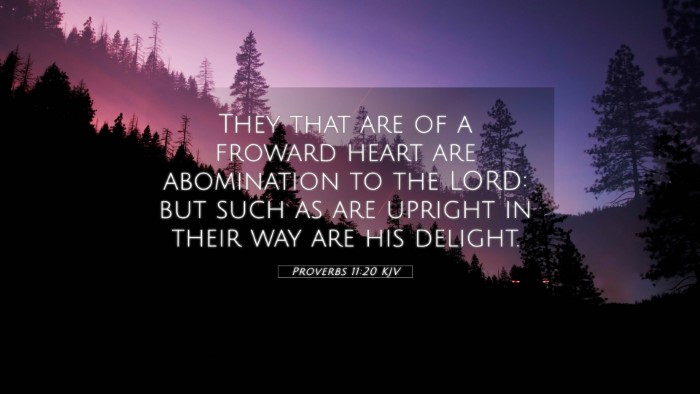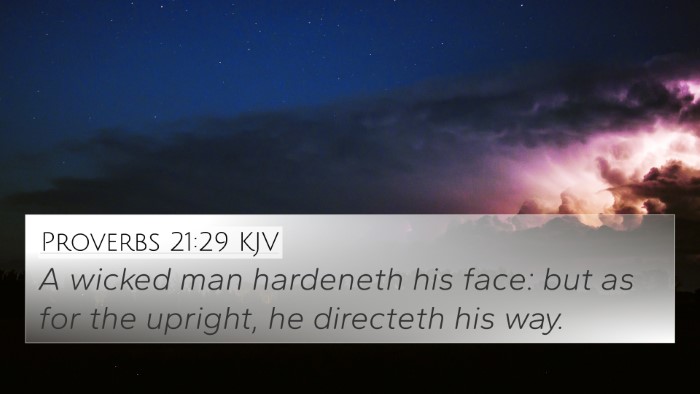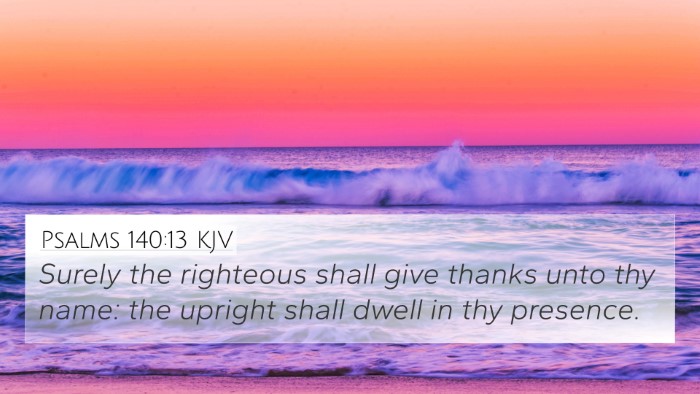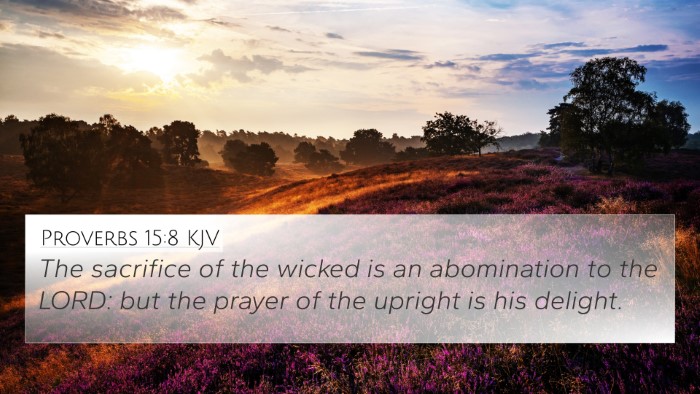Understanding Proverbs 11:20
Bible Verse: Proverbs 11:20 - "They that are of a froward heart are abomination to the LORD: but such as are upright in their way are his delight."
Summary of Meaning
This verse highlights the contrasting attitudes and behaviors of individuals in relation to God's viewpoints. It serves as a moral and ethical guideline, reflecting God's disapproval of wickedness while showing His favor towards righteousness.
Commentary Insights
-
Matthew Henry:
Matthew Henry emphasizes that the term "froward heart" refers to deceitful and perverse intentions that lead one away from righteousness. He asserts that God detests such hearts because they are filled with wickedness, leading to destructive behavior. In contrast, those who maintain an upright character and promote honesty are pleasing to the Lord.
-
Albert Barnes:
Albert Barnes interprets the verse by highlighting the notion of divine judgment against those who are morally corrupt. He discusses how the "upright" refer to individuals who live according to God’s commandments, resulting in divine approval and blessings. The juxtaposition of these two types of hearts serves as a warning against moral corruption.
-
Adam Clarke:
Adam Clarke elaborates on the implications of being viewed as an “abomination” to God. He suggests that such a description underscores a serious condemnation of immorality. Clarke notes the importance of cultivating an upright character, suggesting that one's moral choices have direct consequences on their relationship with God.
Cross-References
Proverbs 11:20 connects with various other Bible verses that reflect similar themes of righteousness and wickedness. Here are some related scriptures:
- Psalm 5:4 - Explores God's detest of wickedness.
- Proverbs 15:8 - Discusses how the prayers of the upright are pleasing to God.
- Isaiah 66:4 - A reiteration of God's disdain for those who turn away from His word.
- 1 Peter 3:12 - Highlights God’s inclination towards the righteous and His disfavor toward evildoers.
- Galatians 6:7 - Warns against reaping what one sows, highlighting the consequences of one’s moral standing.
- Romans 1:18 - Describes God's wrath against unrighteousness, aligning with the theme of divine judgment.
- Philippians 4:8 - Encourages focusing on things that are good and pure, reinforcing the call towards righteousness.
Thematic Connections
The interactions between these scriptures reinforce the idea that God rewards the righteous and punishes the wicked. This theme of divine justice is prevalent throughout both the Old and New Testaments.
Using Cross-references for Deeper Understanding
For those seeking a deeper understanding of the Bible, utilizing tools for Bible cross-referencing can help illuminate the rich interconnections throughout scripture. Here are some tips:
- Utilize a Bible concordance for thematic studies.
- Employ a cross-reference guide during personal study or sermon preparation.
- Explore inter-Biblical dialogue by identifying connections between Old and New Testament themes.
- Conduct a comparative Bible verse analysis for a more profound understanding of doctrinal connections.
Conclusion
Proverbs 11:20 serves as a poignant reminder of the moral dichotomy present in human behavior and God's response to it. The verse is not only an admonition against wickedness but also an encouragement to pursue a life of integrity.
The key takeaways from this verse are:
- God values righteousness and is opposed to deceitfulness.
- Living an upright life brings joy to God.
- Understanding related scriptures enhances our grasp of Biblical themes.
Further Study
For those interested in exploring the connections between Bible verses, consider searching for specific themes or utilizing a cross-reference Bible study approach. Understanding how specific scriptures relate to one another can greatly enrich one’s faith and comprehension of God’s word.

















